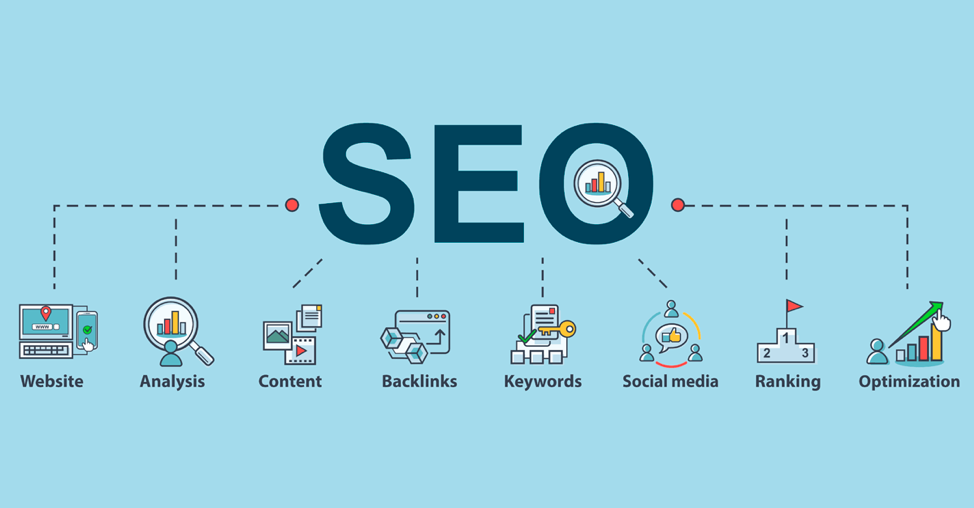Contents
- 1 Understanding SEO and Its Importance
- 2 Keyword Research and Analysis
- 3 On-Page Optimization Techniques
- 4 Off-Page Optimization Strategies
- 5 Mobile Optimization for Enhanced Rankings
- 6 Technical SEO Considerations
- 7 Content Marketing and SEO
- 8 Monitoring and Analyzing SEO Performance
- 9 Staying Up-to-Date with SEO Trends
Search engine optimization (SEO) is a crucial aspect of digital marketing that can significantly impact the visibility and success of your website. When done right, SEO techniques can skyrocket your website’s ranking on search engine results pages (SERPs), leading to increased organic traffic, higher conversions, and improved business growth. In this article, we will unlock the secrets of SEO and explore ten proven strategies that can help you achieve remarkable results.
Understanding SEO and Its Importance

Defining SEO
SEO refers to the practice of optimizing a website to improve its visibility and organic (non-paid) search engine rankings. It involves various techniques and strategies aimed at making your website more attractive to search engines, such as Google, Bing, and Yahoo.
Why SEO Matters for Your Website
In today’s digital landscape, where millions of websites compete for attention, SEO plays a vital role in ensuring your website stands out. By implementing effective SEO strategies, you can attract targeted organic traffic, enhance user experience, and establish your website as an authoritative source in your industry.
Keyword Research and Analysis
The Role of Keywords in SEO
Keywords are the foundation of SEO. They are the words or phrases that users enter into search engines when looking for specific information, products, or services. By understanding and incorporating relevant keywords into your website’s content, you can increase its visibility to users searching for related topics.
Conducting Effective Keyword Research
Keyword research involves identifying the keywords and phrases that are most relevant to your website and target audience. It requires analyzing search volume, competition, and relevance to ensure you choose the right keywords to optimize your content.
Utilizing Keyword Analysis Tools
To streamline your keyword research process, you can leverage various keyword analysis tools such as Google Keyword Planner, SEMrush, and Moz’s Keyword Explorer. These tools provide valuable insights into search volume, keyword difficulty, and related keyword suggestions, helping you make informed decisions.
On-Page Optimization Techniques

Creating Compelling Meta Tags
Meta tags, including the meta title and meta description, are crucial elements that appear in search engine results. Crafting compelling and keyword-rich meta tags can entice users to click on your website’s link and improve your click-through rate (CTR).
Optimizing Page Titles and Headings
Page titles and headings (H1, H2, H3, etc.) play a crucial role in both SEO and user experience. By incorporating relevant keywords into your page titles and headings, you can signal to search engines and users what your content is about.
Crafting SEO-Friendly Content
Creating high-quality and SEO-friendly content is paramount for attracting and engaging users. It involves incorporating relevant keywords naturally, providing valuable information, and structuring your content for readability.
Incorporating Relevant Keywords
Strategically incorporating keywords throughout your content helps search engines understand the topic and relevance of your web pages. However, it is crucial to use keywords naturally and avoid keyword stuffing, which can result in penalties from search engines.
Enhancing Website Speed and User Experience
Website speed and user experience are critical ranking factors. Optimizing your website’s loading speed, implementing responsive design, improving mobile usability, and enhancing navigation can significantly impact user satisfaction and SEO performance.
Off-Page Optimization Strategies
Building High-Quality Backlinks
Backlinks, also known as inbound links, are links from external websites that point to your website. Search engines consider backlinks as votes of confidence, indicating the credibility and authority of your content. Acquiring high-quality backlinks from reputable websites can positively impact your SEO.
Engaging In Guest Blogging and Influencer Outreach
Guest blogging involves writing and publishing articles on other websites within your industry. It helps you gain exposure, build backlinks, and establish yourself as an expert in your field. Influencer outreach involves collaborating with influential individuals or brands to promote your content and gain wider visibility.
Leveraging Social Media For SEO
Social media platforms offer excellent opportunities to promote your content, engage with your audience, and attract social signals (likes, shares, comments). These signals can indirectly influence your SEO performance by driving more traffic and increasing brand awareness.
Mobile Optimization for Enhanced Rankings

The Importance of Mobile-Friendly Websites
With the increasing use of mobile devices, having a mobile-friendly website is no longer optional. Search engines prioritize mobile-friendly websites in their rankings, considering factors such as responsive design, mobile usability, and page loading speed on mobile devices.
Optimizing For Mobile Users
Optimizing for mobile users involves ensuring that your website displays correctly and functions seamlessly on various screen sizes and devices. This includes responsive design implementation, optimizing images and multimedia, and simplifying navigation for mobile users.
Responsive Design and Mobile SEO Best Practices
Implementing responsive design ensures that your website automatically adjusts its layout and elements based on the user’s device. This approach eliminates the need for separate mobile and desktop versions of your website, streamlining maintenance and improving user experience.
Technical SEO Considerations
A well-structured website with logical navigation enhances user experience and search engine crawling. Organize your content using categories, subcategories, and internal linking to ensure search engines can easily discover and index your web pages.
Implementing XML Sitemaps and Robots.Txt
XML sitemaps help search engines understand the structure of your website and index your content more efficiently. Robots.txt is a file that instructs search engine crawlers on which pages to crawl and index. Properly implementing both can improve your website’s visibility in search results.
Ensuring Proper URL Structure
Clear and descriptive URLs not only make it easier for users to understand the content but also help search engines categorize and rank your web pages. Include relevant keywords in your URLs and avoid using unnecessary parameters or numbers.
Fixing Crawl Errors and Broken Links
Regularly monitoring and fixing crawl errors and broken links is crucial for maintaining a healthy website. Broken links can negatively impact user experience and SEO performance. Utilize tools like Google Search Console to identify and fix these issues promptly.
Implementing Schema Markup for Rich Snippets
Schema markup is a structured data format that helps search engines understand the content and context of your web pages. By implementing schema markup, you can enhance your search engine listings with rich snippets, such as star ratings, reviews, and product information.
Content Marketing and SEO

Content marketing is an essential component of SEO. By creating valuable, informative, and engaging content, you can attract organic traffic, gain backlinks, and establish your brand as an industry authority. Understand your target audience’s needs and preferences to create content that resonates with them.
Incorporating Targeted Keywords Naturally
While keywords are important, it is crucial to incorporate them naturally and avoid keyword stuffing. Focus on creating high-quality content that provides value to your audience, and use keywords in a way that enhances the user experience and the overall flow of your content.
Using Multimedia to Enhance Engagement
Incorporating multimedia elements, such as images, videos, infographics, and interactive elements, can significantly enhance user engagement. Visual content not only makes your web pages more appealing but also helps convey information more effectively.
Encouraging User-Generated Content
User-generated content, such as reviews, comments, and testimonials, can boost your website’s credibility and social proof. Encourage your audience to share their experiences and opinions and provide opportunities for user-generated content on your website and social media platforms.
Monitoring and Analyzing SEO Performance
Utilizing Google Analytics and Search Console
Google Analytics and Google Search Console are powerful tools that provide valuable insights into your website’s performance. They allow you to track organic traffic, keyword rankings, user behavior, conversion rates, and other metrics critical for monitoring and analyzing SEO performance.
Tracking Keyword Rankings and Organic Traffic
Regularly monitoring keyword rankings and organic traffic helps you evaluate the effectiveness of your SEO efforts. By tracking these metrics, you can identify trends, measure the impact of optimization strategies, and make data-driven decisions to improve your website’s performance.
Analyzing User Behavior and Conversion Rates
Understanding how users interact with your website is crucial for optimizing its performance. Analyze metrics like bounce rate, time on page, and conversion rates to identify areas for improvement and enhance the overall user experience.
Staying Up-to-Date with SEO Trends
Following Industry Blogs and Resources
SEO is a dynamic field with frequent updates and algorithm changes. Staying up-to-date with the latest SEO trends, strategies, and best practices is essential. Follow reputable industry blogs, subscribe to newsletters, and join relevant communities to stay informed about the evolving SEO landscape.
Keeping Up with Algorithm Updates
Search engine algorithms evolve to provide the best user experience and deliver relevant search results. Stay informed about algorithm updates, such as Google’s core algorithm updates, and understand their potential impact on your website’s ranking. Adapt your SEO strategies accordingly.
Implementing Emerging SEO Techniques
As technology and user behavior evolve, new SEO techniques and strategies emerge. Stay ahead of the competition by exploring and implementing emerging SEO techniques, such as voice search optimization, local SEO, and structured data optimization, to gain a competitive edge.
Unlocking the secrets of SEO is essential for improving your website’s ranking and attracting targeted organic traffic. By implementing the ten proven strategies outlined in this article, with the assistance of easyseo.ai, you can optimize your website effectively and achieve remarkable results. EasySEO.ai is an innovative AI-powered platform that simplifies and streamlines the SEO process, providing you with actionable insights and recommendations to enhance your website’s performance.
Remember to conduct thorough keyword research, focus on on-page and off-page optimization, prioritize mobile and technical SEO, create valuable content, monitor performance, and stay up-to-date with the ever-changing SEO landscape. By utilizing EasySEO.ai’s comprehensive suite of tools and features, you can unlock the full potential of your website and drive sustainable growth in a more efficient and effective manner.

